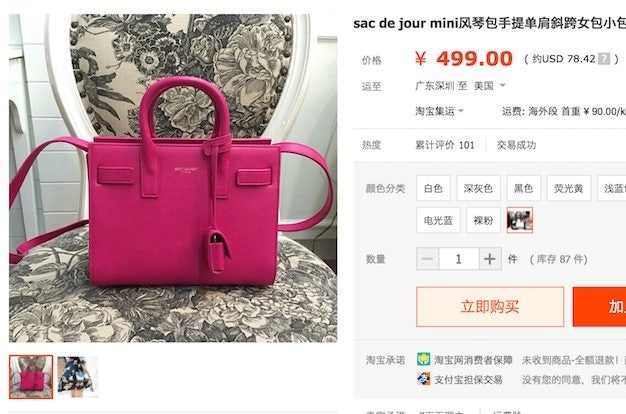
E-commerce giant Alibaba yet again saw staggering sales growth for its annual Singles’ Day online shopping bonanza yesterday, surging ahead of last year’s $9 billion in sales with $13.8 billion this year. But these massive numbers didn’t stop its stock price from falling as it grapples with controversies related to sales of counterfeit products on its platforms.
Despite its stunning Singles’ Day success, Alibaba shares declined 2 percent on November 11. According to MarketWatch, this slump follows a pattern from last year in which stock prices grew in the month leading up to Singles’ Day and then began to plummet afterward. Alibaba’s stock prices hit an all-time high on the day before Singles’ Day in 2014, but then declined 3.8 percent on Singles’ Day itself and plunged for six straight months afterward.
Although Alibaba has seen steadily increasing revenue this year and has a growing list of international brands signing up for its platforms, it has been grappling with a host of disputes over counterfeits that are posing challenges for attracting foreign investors and high-end labels.
Just one day before Singles’ Day, Reuters reported that a lawyer for Kering released a harsh statement regarding its ongoing lawsuit against Alibaba for allowing fake luxury goods to be sold on its platforms. After Alibaba CEO Jack Ma said in a recent interview, ”I would [rather] lose the case, lose the money... But we would gain our dignity and respect,” Kering’s lawyer wrote a letter to the judge at the New York court handling the case stating that the plaintiffs were “greatly troubled” by Ma’s statement. "It leaves the impression... that Alibaba's request for mediation was not made in good faith, but rather as a tactic to delay this case and to force Plaintiffs to expend resources spinning their wheels in an expensive and time-consuming mediation."
Kering filed the lawsuit in May, accusing Alibaba of failing to do enough to stop the sales of knockoffs of Kering brands including Gucci and Yves Saint Laurent on its platforms.
This scathing statement comes not long after industry organizations have called for the U.S. Trade Representative to add Alibaba.com and Taobao back to its “notorious markets” list for counterfeits. Both sites had been added in 2008, but Alibaba.com was removed in 2011 and Taobao was taken off a year later in 2012. Recently, the American Apparel and Footwear Association (AAFA), the Trademark Working Group, and Spanish anti-counterfeit group ANDEMA have publicly criticized Alibaba for counterfeits. In September, the U.S. Chamber of Commerce cited Alibaba’s AliExpress as a source of concern over counterfeits in a report on China’s compliance with World Trade Organization regulations.
All of this controversy comes after Alibaba was criticized by its own government for the proliferation of fakes on its site, when China’s State Administration for Industry and Commerce (SAIC) published a white paper on its website accusing the company of allowing the sale of counterfeits and illegal goods. The white paper was taken down after being disputed by Alibaba, but prompted a U.S. law firm to file a class-action lawsuit as a result, saying that Alibaba had not disclosed a previous meeting with SAIC over counterfeit concerns to investors. More recently, Xinhua published an article stating that more than 40 percent of products sold online are shoddy or fake in a move that's likely to create further difficulties for Alibaba.
These legal issues are especially troublesome for Alibaba from a PR standpoint as it aims to attract more premium international brands to set up shop on its platforms and convince international investors of the legitimacy and stability of its business.
While Alibaba has had its fair share of foreign brands signing up for its Tmall platform recently—Macy’s, Tesla, L’Occitane, Estée Lauder, Calvin Klein, and Fossil are just a few of the big names—most traditional luxury brands apart from Burberry have been wary of joining. These big signings haven’t been enough to woo foreign investors, as Alibaba’s peak pre-Singles’ Day stock of $85.40 on November 4 this year was far lower than last year’s $119.15.
In response, Alibaba has been lobbying to remain off the “notorious markets” list and has been campaigning to emphasize its heightened efforts to fight fakes. The company’s lawyers along with chief of government affairs Eric Pelletier recently met with an inter-agency working group that the U.S. Trade Representative coordinated in order to present their case to remain off the list, according to Reuters.
The company has also been on a PR offensive to emphasize new developments in fake-fighting efforts, such as a more streamlined process for reporting fakes and working with the police to crack down on counterfeit vendors. In a recent Bloomberg interview on the counterfeit accusations, Ma stated that Alibaba is “also a victim” of counterfeiters, claiming that for every one counterfeit sold, the company will lose five customers. Now, it's up to investors and brands to decide whether or not they agree.